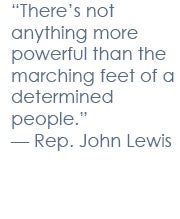Hearing civil rights icon Rep. John Lewis speak about his experiences in Selma, Alabama, at lunch counters in Nashville, Tennessee, and at the March on Washington is undeniably moving and inspiring. But hearing him describe the minute details of those seminal events — and his personal story that led him there — transported an Aspen Institute audience back to a time, not too long ago, that serves as a lingering reminder of why we should never forget the evils of discrimination and segregation.
Lewis, who has represented Atlanta as a congressman since 1986, spoke of growing up in rural Alabama on the family farm. At an early age, he wanted to be a minister, so he and his brothers and sisters would gather the chickens in the chicken yard, and as he preached to them, he recalled, “some chickens would bow their heads, some shook their heads — they never quite said amen. Still, they tended to listen to me much better than some of my colleagues listen to me in Congress.”
As a child, Lewis noticed all the signs that indicated where colored men, women, and children could and could not go. When he asked his parents why, they told him that’s just the way it was.
But when, in 1955, at the age of 15, Lewis heard Martin Luther King Jr. on the radio, “his words inspired me to find a way to get in the way… I felt like he was speaking directly to me: ‘John Robert Lewis, you too can do something,’” he said.
Lewis met King three years later, after corresponding with him about not hearing back from the college he had applied to — the college closest to his home, which did not accept blacks. “From that moment on, I knew I could not turn back,” he said.
He spoke of his days in college in Nashville, learning the art of nonviolent protest and participating in several lunch counter sit-ins. The Nashville movement was so disciplined, he said, that “when people put hot cigarettes on us, or dumped water or hot coffee on our heads and down our backs, we didn’t strike back.”
Lewis said he grew up sitting on those lunch counter stools and “accepted the way of peace, the way of love, as a way of living, not just a technique.”
Perhaps the greatest test for Lewis, who had become chairman of the Student Nonviolent Coordinating Committee (SNCC) and his fellow protesters came on March 7, 1965, during the voting rights march from Selma to Montgomery, Alabama. Some 600 protesters left from a church and were crossing a bridge over the Alabama River. Lewis described a chilling exchange with another protester about the possibility of having to jump. He remembered his backpack, which held two books, an apple, an orange, toothbrush, and toothpaste (because he anticipated having to go to jail) and the line of Alabama state troopers — armed with clubs, tear gas, and bull whips — that the marchers encountered, led by Sheriff Jim Clark, whose lapel, Lewis remembered, sported a button that read, “Never.”

Like many others that day, Lewis was beaten with a billy club. He sustained a skull fracture and was later taken to the hospital. But as clear as his memory is, going back to the age of four, “almost 50 years later I cannot recall how I made it back across the bridge… I thought I was going to die.”
Yet, Bloody Sunday got the nation’s attention. And it led to nonviolent marches and protests across the nation, Lewis noted. Shortly thereafter, the Voting Rights Act was signed into law.
“There’s not anything more powerful than the marching feet of a determined people,” he said. “When people are marching together in an orderly, peaceful, nonviolent fashion, that can appeal to all of humankind.”
No matter the cause or injustice, Lewis called nonviolent protest an “immutable principle that you cannot deviate from. If you want to have a good end, your means must be good and noble. Somehow, some way, the end must be caught up in the means.”
There is still a need in America for the kind of leadership and action against injustice that eventually earned Lewis the Presidential Medal of Freedom, he said. Lewis said he cried when in 2013 the US Supreme Court struck down two provisions of the Voting Rights Act, and is disappointed at current efforts that will make voting more difficult.
“My view is the vote is precious, almost sacred, the most powerful nonviolent tool we have in our democratic society, and it should be accessible,” he said.
On the fact that, 60 years after Brown v. Board of Education, many schools in poor neighborhoods have become segregated by race and class, Lewis noted, “we have made progress but we’re not there yet. We still have a great distance to go in America before we lay down the burden of discrimination.”
And on the divided, obstructionist Congress, Lewis affirmed a tweet he recently posted that said if the Civil Rights Act were before Congress today, it probably would not pass, let alone make it off the floor for a vote.
Despite all this, Lewis has a message for young Americans. He recently published a graphic novel, “March,” the first in a trilogy of comic books that tells the story of the civil rights era through his life experiences, and that has become both a best-seller and required reading for some 15,000 students. He chose the comic book format, he said, specifically to reach young people and help them understand, through words and images, what happened.
“Find a way to get in the way,” he advises. “Find a way to get in trouble, good trouble, necessary trouble. Be prepared to speak up and speak out, be courageous. When you see something that’s not right, not fair, not just, you have a moral obligation to get in the way and make some noise.”
RELATED CONTENT:
